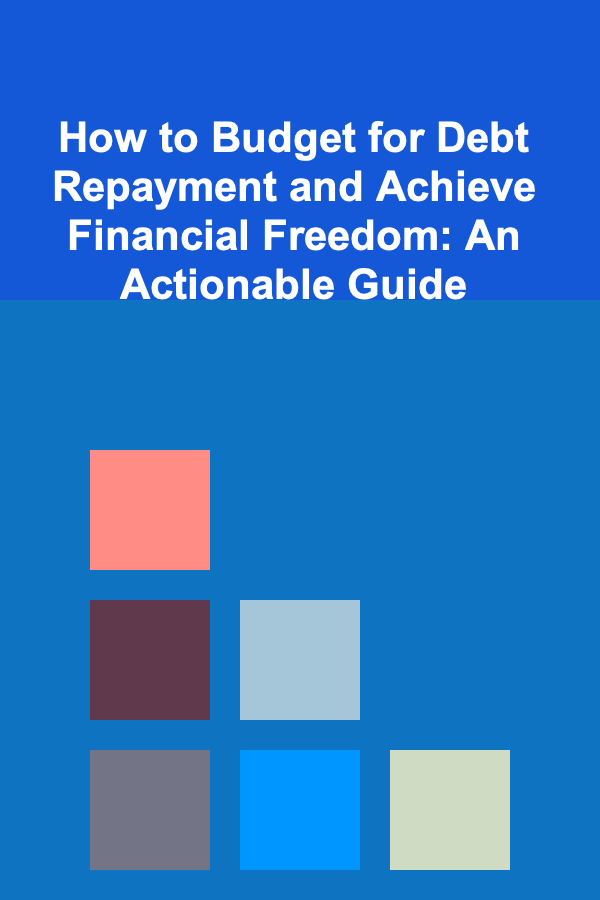
How to Budget for Debt Repayment and Achieve Financial Freedom: An Actionable Guide
ebook include PDF & Audio bundle (Micro Guide)
$12.99$10.99
Limited Time Offer! Order within the next:

Achieving financial freedom is a goal many aspire to, but it can often feel out of reach, especially when debt is a significant barrier. Whether you're carrying student loans, credit card balances, or other forms of debt, creating a strategic budget to pay down what you owe is a critical step toward financial independence.
In this actionable guide, we'll break down the process of budgeting for debt repayment, provide effective strategies for managing debt, and discuss how to ultimately achieve financial freedom. It's not about cutting corners but making sustainable, intelligent choices that move you closer to living debt-free.
Understanding Your Debt Situation
Before you dive into budgeting for debt repayment, it's crucial to understand the full scope of your financial obligations. Take time to gather all the details about each debt you owe, whether it's credit cards, mortgages, personal loans, or other liabilities.
Step 1: List All Debts
Start by making a comprehensive list of all your debts. This should include the following details:
- Creditor name
- Total amount owed
- Interest rate
- Minimum monthly payment
- Due dates
Having this information will give you a clear picture of your liabilities and help you organize your strategy.
Step 2: Calculate Your Total Debt
Once you've listed all your debts, calculate the total amount owed. This will help you set goals and track your progress over time. You'll want to know the total sum to effectively plan how to allocate funds for repayment.
Step 3: Understand Your Debt-to-Income Ratio
Your debt-to-income ratio (DTI) is an important metric that lenders use to evaluate your financial health. It's calculated by dividing your total monthly debt payments by your gross monthly income.
A high DTI may make it harder to secure loans or credit, and it's a sign that you need to prioritize paying down your debt. Typically, financial experts recommend keeping your DTI below 36%.
Creating a Debt Repayment Budget
Now that you understand the full scope of your debt, it's time to create a budget that prioritizes repayment. Here's how to craft a smart, actionable plan:
Step 1: Track Your Income and Expenses
Begin by evaluating your income versus your current expenses. Be honest about where your money goes every month. Tools like budgeting apps (e.g., Mint, YNAB) can help you track your income, categorize your expenses, and identify areas where you can cut back. Your goal is to create a budget that allows you to allocate a larger portion of your income toward debt repayment.
Step 2: Prioritize Debt Repayment
One of the most important principles in budgeting for debt repayment is prioritization. Not all debt is created equal. High-interest debt, such as credit card balances, should be your primary focus. However, you should also consider the following approaches:
Debt Snowball Method
This approach suggests focusing on paying off your smallest debts first. Once the smallest debt is paid off, you take the money you were using to pay that debt and apply it to the next smallest debt. This method provides quick wins, which can motivate you to keep going.
Pros: Psychological boost from clearing debts quickly, simpler to track progress.
Cons: May take longer to pay off high-interest debt if small debts are prioritized.
Debt Avalanche Method
In this method, you focus on paying off debts with the highest interest rates first, regardless of their size. This reduces the overall amount you'll pay in interest, saving you money in the long term.
Pros: Saves more money by reducing the impact of high-interest rates.
Cons: Can be less motivating since you might not see progress as quickly as with the snowball method.
Step 3: Set a Realistic Timeline
Determine how long it will take to pay off each debt, and then set a realistic timeline. Be sure to account for all necessary expenses and leave room for emergencies. If you're paying off high-interest debts first, it may take longer than if you start with smaller balances. Use an online debt repayment calculator to estimate how long it will take to pay off your debts with different repayment strategies.
Step 4: Allocate Funds for Debt Repayment
Based on your budget, determine how much money you can afford to allocate toward paying off your debt each month. This could involve making sacrifices in areas like dining out, entertainment, or luxury purchases. Prioritize debt repayment by allocating as much as you can comfortably afford.
It's also important to set up automatic payments if possible, to avoid missing deadlines and accruing additional fees. Automating payments helps you stay disciplined in your financial journey.
Step 5: Adjust as Necessary
Your financial situation may change over time. Unexpected expenses or new income streams can impact your ability to pay off your debts. Be flexible with your budget. For example, if you get a raise or reduce other expenses, apply any extra funds toward your debts to accelerate your progress.
Cutting Expenses to Free Up More Money for Debt Repayment
The more money you can free up for debt repayment, the quicker you'll achieve financial freedom. To do this, you need to focus on reducing your discretionary spending. Here are several effective strategies:
1. Audit Your Subscriptions
Many people have subscriptions they no longer use or need. These can range from streaming services to gym memberships. Take a look at your recurring expenses and cancel anything that doesn't provide value.
2. Reduce Utility Costs
Review your utility bills for opportunities to reduce costs. Simple changes like turning off lights when not in use, using energy-efficient appliances, or lowering your thermostat can add up over time.
3. Cut Down on Dining Out
While eating out can be enjoyable, it's a significant drain on your finances. Plan and cook more meals at home. You can save a lot of money by reducing the frequency of dining out and taking lunches to work.
4. Downsize or Refinance Big Expenses
If you're carrying significant debt in the form of a mortgage or car payment, consider options like refinancing or downsizing. A lower mortgage rate can save you thousands over time, and selling an expensive car for a more affordable model can free up more funds for debt repayment.
5. Sell Unnecessary Items
Decluttering can also help you raise extra cash. Sell items you no longer use, such as old furniture, electronics, or clothing. Use the proceeds to pay down your debts.
Building an Emergency Fund
While paying down debt is important, you don't want to fall into the trap of getting into more debt in case of an emergency. That's why building an emergency fund is crucial. A small emergency fund (typically around $500 to $1,000) can protect you from having to rely on credit cards or loans during unforeseen events.
Once you've eliminated high-interest debt, aim to build a fully-funded emergency fund (usually 3 to 6 months' worth of living expenses). This ensures that you're prepared for any financial surprises without compromising your long-term financial goals.
Strategies to Avoid Accumulating More Debt
As you work toward paying off your existing debts, it's crucial to avoid accumulating more. Implement the following strategies:
1. Avoid New Debt
Don't take on new loans or open new credit cards while you're in the process of paying off existing debt. If you must make a large purchase, save for it in advance instead of relying on credit.
2. Use Cash or Debit Cards
Whenever possible, use cash or a debit card for purchases rather than credit cards. This will help you avoid building up new debt and keep you within your budget.
3. Negotiate Lower Interest Rates
For credit card debt, contact your creditors and ask for a lower interest rate. If you have a solid payment history, they may be willing to accommodate your request, which can save you money over time.
Achieving Financial Freedom
Once you've developed a solid strategy for paying off debt and have made progress in your repayment journey, the next step is achieving financial freedom. Financial freedom is the ability to live without being reliant on debt, allowing you to make choices that prioritize your well-being rather than constantly worrying about your financial obligations.
Here's how to work toward long-term financial freedom:
1. Save and Invest
As you eliminate debt, start focusing on saving and investing. Contribute to retirement accounts (401k, IRAs) and invest in assets that grow in value over time (stocks, bonds, real estate). The earlier you start investing, the more time your money will have to grow.
2. Diversify Income Streams
Create multiple income streams to reduce dependency on a single paycheck. This could include starting a side business, investing in real estate, or taking on freelance work. Multiple streams of income provide financial stability and security.
3. Live Below Your Means
To achieve financial freedom, continue living below your means even after you've paid off debt. Resist the temptation to inflate your lifestyle as your income grows. Instead, focus on saving and investing to secure long-term wealth.
Conclusion
Budgeting for debt repayment and achieving financial freedom is a journey that requires discipline, patience, and a willingness to make tough decisions in the short term for long-term benefits. By understanding your debt, creating a realistic repayment budget, cutting unnecessary expenses, building an emergency fund, and avoiding new debt, you can gradually free yourself from the burden of debt and take control of your financial future. Keep focused on your goals, make adjustments when necessary, and continue to invest in your financial well-being. Financial freedom isn't a destination---it's a process that can be achieved with persistence and smart planning.

How to Assess Lawn Care Needs for Your Home's Unique Climate
Read More
How to Implement a Customer Retention Strategy for Online Sales
Read More
How to Manage Your Money Effectively to Save and Invest
Read More
How to Prevent Fleas and Ticks in Your Home and Pet
Read More
How to Set Up a Check-in System for Volunteers
Read More
10 Tips for Budgeting When You Have Debt
Read MoreOther Products

How to Assess Lawn Care Needs for Your Home's Unique Climate
Read More
How to Implement a Customer Retention Strategy for Online Sales
Read More
How to Manage Your Money Effectively to Save and Invest
Read More
How to Prevent Fleas and Ticks in Your Home and Pet
Read More
How to Set Up a Check-in System for Volunteers
Read More